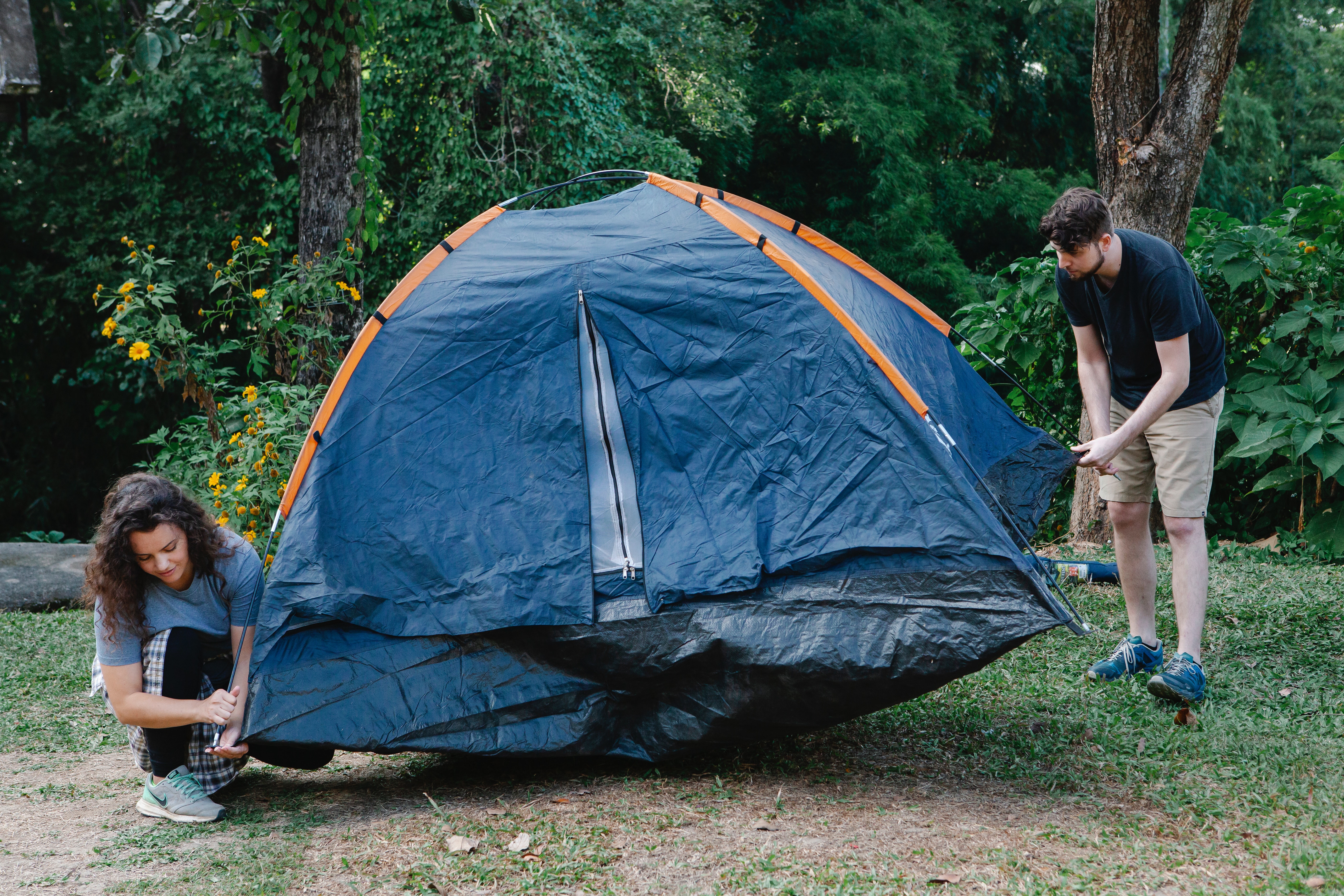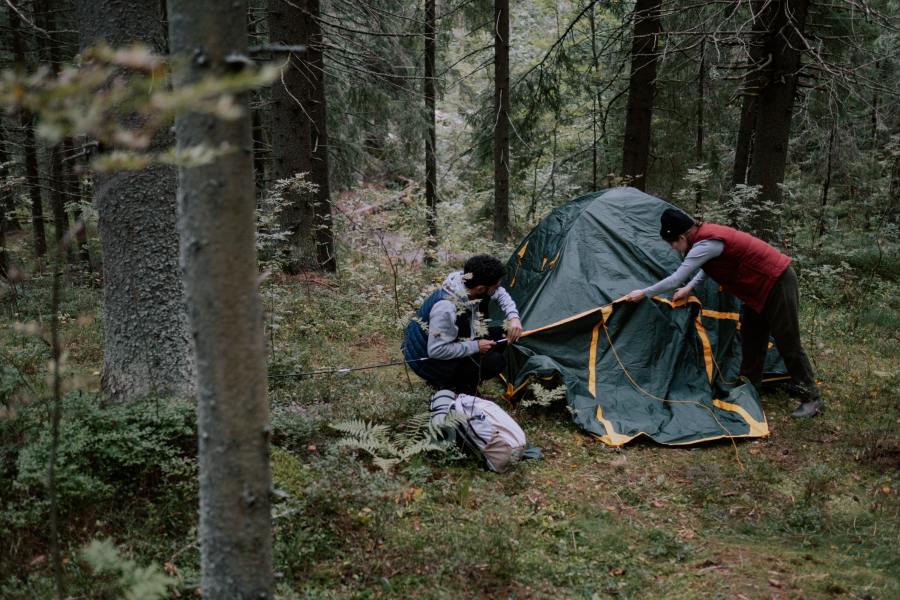With the promise of easy pitching and affordable pricing, pop-up tents have grown in popularity over the past few years. Although pop-up tents have been on the market for some time, opinions about them remain divided. While some enthusiasts insist that they’re ideal for weekend camping trips, others dismiss them as not being ‘proper’ tents.
So let’s take a closer look and find out if pop-up tents really are good or bad. Also make sure you check out our other Pop-up tent explainers Are Pop-up tents waterproof? and Are Pop-Up Tents Good For Wild Camping?
Are Pop-Up Tents Good
- Quick Setup
- Affordable
- Lightweight
- Versatile
Quick Setup
There’s something really appealing about the fact that you could head off for a weekend of camping after work on a Friday, pull up at a campsite and have your tent pitched in less than a couple of minutes.
Anything that removes the barriers that stop people from getting outdoors more is a good thing in my book and the ease and convenience of a pop-up tent could be just the thing that some people need to start camping regularly.
Affordability
It’s no great surprise that pop-up tents are so popular when you consider just how affordable they are.
Visit any major retailer like Amazon, Argos or Go Outdoors and you can easily find a selection of pop-up tents that will leave you plenty of change from £50.
Lightweight
Perhaps this reveals my age, but during my childhood family camping adventures, it required a team effort—of at least three of us—to haul the tent from the boot of my dad’s Ford Sierra. You definitely wouldn’t have that problem with a pop-up tent.
Most pop-up tents are designed to be lightweight and easily carried, adding to the appeal.
Versatility
Festivals, beaches, weekend camping trips and back garden campouts; the pop-up tent is suitable for all of those things and when you factor in the price and the ease of pitching, you can see why these tents sell so well through the summer months.

Photo by Vanessa Garcia
The Bad
- Poor Durability
- Questionable Water Resistance
- Lack of Ventilation
- Environmental Impact
Poor Durability
Unfortunately, they don’t seem to be made with longevity in mind. Take the average pop-up tent and compare it with the average ‘normal’ tent and you’ll soon notice the difference in quality. The materials, seams, zips and poles are all cheaply made and are unlikely to last anywhere near as long as a more traditional tent.
Of course, there are exceptions to the rule and there are more premium pop-up tents available, but by opting for one of those you are not going to get the same level of affordability.
Questionable Water Resistance
Very few pop-up tents offer a good waterproof rating. This may be fine for you if you’re only ever planning to use the tent in good weather, but if there’s a chance of heavy, consistent rain then there’s also a good chance that your pop-up tent will start to allow water in.
Aside from the fact that many have a hydrostatic head (HH) rating of between 1000 and 1500, the seams are often a weak spot and may well leak before the main fabric.
Lack of Ventilation
Another common problem is the lack of ventilation. This can allow moisture to build up in the tent overnight and you might wake up to find the inner walls running with condensation.
Environmental Impact
Sadly, the affordability of these has meant that literally thousands upon thousands of these things get abandoned at festivals every summer. They’re used for just a weekend and then left for someone else to deal with.
The issue becomes glaringly obvious when you consider the environmental impact: these tents are manufactured in China using non-eco-friendly materials like plastics, shipped across the globe, and then often used just for a single weekend before being discarded.
Are Pop-Up Tents Worth It?
When it comes to the question of whether pop-up tents are worth the investment, the answer isn’t straightforward. While they do offer a range of benefits, such as quick setup and affordability, they also come with a set of drawbacks that can’t be ignored.
One of the most significant concerns is with their durability. If you’re a casual camper who only ventures out once or twice a year, a pop-up tent might suffice. However, for those who plan on regular camping trips, investing in a more robust, waterproof, and durable tent is advisable.
The materials used in pop-up tents are often not as sturdy as those in traditional tents. The seams, zips, and poles are generally of lower quality, which means they are more susceptible to wear and tear. So, while you might save money upfront, you could end up spending more in the long run as you replace your pop-up tent more frequently.
The allure of a pop-up tent often lies in its ease of setup. After a long week, the last thing you want to do is spend your Friday evening wrestling with tent poles and instructions. They eliminate this hassle, allowing you to get your campsite up and running in a matter of minutes. But is this convenience worth sacrificing durability and long-term value? That’s a question only you can answer, but for regular campers, the trade-off might not be worth it.
Good or Bad: The Verdict
If you’re looking for a cheap and easy option for your camping adventures in good weather, then a pop-up tent is a good, convenient choice. But, unless we tackle the issue of these items being seen as disposable and often left behind at festivals and campsites each summer, perhaps they should face a ban – along with the disposable barbecue.

Written by Rob Haggan
Rob is the face behind Weekend Adventurers. He’s been an outdoor enthusiast since childhood, and his passion has only grown stronger over the years. His work has been recognised by Ordnance Survey, naming him as a Get Outside Champion for four consecutive years.








